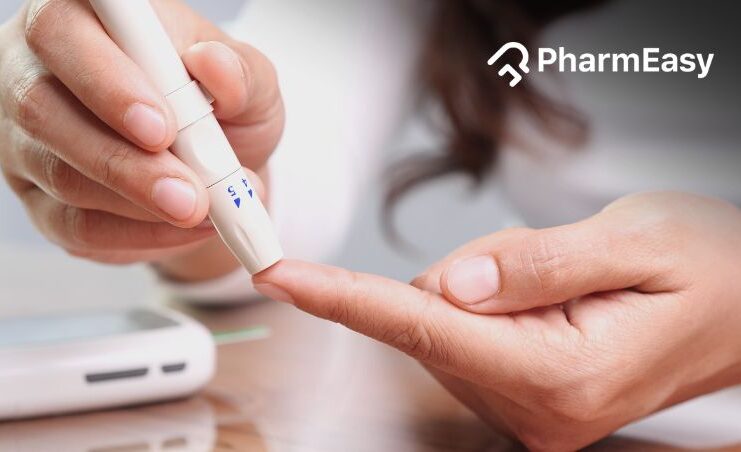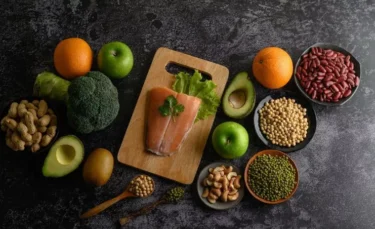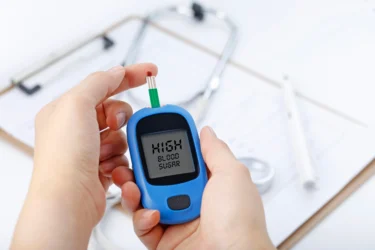
Introduction
For good health, especially for people suffering from conditions like diabetes or prediabetes, keeping blood sugar levels in check is key. High sugar levels in the blood could lead to many health problems. Hence, it’s crucial to regulate these levels.
In this article, we will delve into different elements that shape blood sugar levels. Besides, we will touch upon tried-and-tested ways and guidelines that may help manage and bring down blood sugar levels right away. Lastly, we will answer some frequently asked questions regarding this topic.
Did you know?
- Regular exercise can lower blood glucose levels and improve insulin sensitivity. source: diabetes.org
- A diet rich in fiber and whole grains, low in saturated fat, and low glycemic index can reduce diabetes risk. source: CDC
- Low blood sugar (hypoglycemia) can be treated by consuming four glucose tablets or four ounces of fruit juice or regular soda. source: CDC
- Eating a healthy diet, maintaining a healthy weight, and getting regular physical activity can help manage blood sugar levels. source: CDC
Understanding the Factors Affecting Blood Sugar Levels
1. Food
The kind of food you eat affects blood sugar control. What you eat, how much you eat, and when you eat can directly impact your blood sugar levels1.
- Types of foods: Different foods can change your blood sugar levels in different ways. Mostly, carbohydrates ignite a significant change since digestion breaks them down into glucose. But carbohydrates that are slow-digesting or have low absorption rates like whole grains and fiber-rich foods, may help stabilize blood sugar levels2,3.
- Meal timing and blood sugar: Steady meal schedules are key to controlling blood sugar levels. This may help avoid sudden spikes or dips in blood sugar levels.
2. Exercise
Exercise aids in blood sugar regulation. It’s important to balance different exercise types, as they affect blood sugar levels in unique ways.
- Different exercise types and their effects: Aerobic exercises like walking, swimming, and cycling seem to lower blood sugar levels. They increase the body’s sensitivity to insulin and boost glucose breakdown. Resistance training, such as lifting weights, help build muscle mass, enhancing long-term control of blood sugar4,5.
- Finding the right balance of exercise for managing blood sugar: It’s key to find the right mix of aerobic exercises and resistance training to manage your blood sugar effectively. For a personalized exercise plan, your healthcare provider can guide you according to your specific needs and aims.
3. Medication
People, especially those with diabetes, often need medication to keep blood sugar levels in check.
- Insulin: Insulin, a hormone, regulates blood sugar levels. People with diabetes might need insulin shots to either supplement their body’s insulin production or replace it if they have type 1 diabetes. Also, in case of uncontrolled type 2 diabetes mellitus as well, insulin may be advised.
- Oral medications: Oral medicines can enhance insulin sensitivity, improve insulin production, or aid glucose absorption in the body. These are used mostly in type 2 diabetes.
- Adjusting medication based on blood sugar readings: Your healthcare provider may need to tweak your medication dose based on regular blood glucose readings. Regular testing of blood glucose levels is important when taking medication for managing diabetes.
4. Illness
Illness can significantly shape blood sugar control. Infections, fever, stress, among other factors, can lead to a surge in blood sugar levels. During sickness, it’s crucial to monitor your blood sugar levels closely and modify your diabetes management plan if needed.
- Effect of illness on blood sugar: Illness typically raises the body’s energy demand. This, in turn, can elevate your blood sugar levels. Plus, stress-related hormonal changes during illness can directly affect blood sugar control.
- Managing blood sugar during illness: When you’re sick, keep taking your prescribed diabetes medicines. Also, check your blood sugar levels frequently. Consult your healthcare provider for advice on adjusting your medication or insulin dose. They can also provide guidance on staying well-hydrated and managing your diet.
5. Alcohol
Drinking alcohol can directly shape your blood sugar levels.
Drinking moderate amounts of alcohol can lead to low blood sugar. This happens as alcohol limits the liver’s ability to release glucose. Drinking too much alcohol, especially with sugary drinks can elevate blood sugar levels.
- Safe consumption guidelines for diabetics: If you have diabetes and choose to drink alcohol, limit your intake. The American Diabetes Association suggests no more than one drink per day for women and no more than two drinks per day for men6. Make sure you discuss your alcohol drinking habits with your healthcare provider to understand how it could impact your blood sugar levels.
6. Menstruation and menopause
Fluctuations in estrogen and progesterone during menstruation and menopause can directly affect insulin sensitivity and blood sugar control. This can lead to more variability in blood sugar levels7.
It’s crucial to closely watch your blood sugar levels during menstruation and menopause. Work closely with your healthcare provider to modify your diabetes management plan, such as changing medication or insulin doses, as required.
7. Stress
Stress can directly influence blood sugar control, especially for people with diabetes. Stress hormones like cortisol and adrenaline can lead to a rise in blood sugar levels. These stimulate glucose production and reduce insulin sensitivity8. Thus, managing stress is crucial for keeping healthy blood sugar levels. Practices like deep breathing, meditation, and yoga may help reduce stress, making diabetes management more effective9,10.
Although exercising helps lower blood sugar levels, one should avoid exercising if the blood sugar is more than 240 mg/dL. Exercise may increase ketone levels, which increases your chance of developing ketoacidosis. So, if your blood sugar levels are this high, you should first get your ketone levels checked and exercise only if these are not elevated15.
Dr. Siddharth Gupta, BAMS, MD (Ayu)
Methods That May Be Tried to Reduce Blood Sugar Levels Immediately
There are multiple ways and measures that may assist you in managing your blood sugar levels. They may also help decrease the chance of complications linked to diabetes. These include:
1. Taking prescribed insulin or medication
Taking your prescribed insulin or oral diabetes medicine as guided by your healthcare provider is crucial for keeping healthy blood sugar levels. Follow their advice for dose changes if required. Always consult them if you experience any problems or side effects from your drugs.
- Insulin dosages and timing: Your healthcare provider will decide the right insulin dosage and timing based on your individual needs, blood sugar levels, and lifestyle. Make sure you follow their guidance carefully and modify your dosage if needed only under their supervision.
- Other diabetes medications: Oral diabetes drugs, such as metformin, sulfonylureas, and DPP-4 inhibitors, could also be prescribed by your healthcare provider. These drugs work by enhancing insulin sensitivity, boosting insulin production, or aiding glucose absorption. Always take these drugs as directed by your health care provider.
2. Adjusting food intake
Conscious eating can greatly influence your blood sugar levels. Consider adding healthier choices into your meals, such as whole grains, lean proteins, fruits, and vegetables1,2,3.
- Low glycaemic index foods: Eating low glycaemic index foods can help control your blood sugar levels. They result in a slow and steady glucose release into your bloodstream. Whole grains, legumes, certain fruits and vegetables, and nuts are examples of low glycaemic index foods.
- Fiber-rich foods: Fiber-rich foods, such as fruits, veggies, and whole grains, can stabilize blood sugar levels. They do this by slowing digestion and glucose absorption.
- Proper portion sizes: Proper portion sizes also help to manage your blood sugar levels. Eating too much can spike blood sugar, while not eating enough can drop blood sugar or cause hypoglycaemia.
3. Engaging in physical activity
Regular exercise is key to keeping blood sugar levels healthy. It makes your body use insulin more efficiently and boosts glucose breakdown.
- Aerobic exercises: Aerobic exercises like walking, running, swimming, or cycling can bring down blood sugar levels. They help enhance insulin sensitivity and glucose metabolism. As recommended by the American Diabetes Association, aim for at least 150 minutes of medium-intensity aerobic activity each week5.
- Resistance training: Resistance training, like lifting weights, can improve blood sugar control by building muscle mass and increasing your body’s insulin sensitivity. Plan for at least two resistance training sessions per week on separate days.
- Impact of different exercise intensities: Your workout intensity can also shape your blood sugar levels. Higher-intensity athletics may need more detailed blood sugar control and tracking, while medium-intensity workouts are usually safe and helpful for most diabetes patients. Always consult your healthcare provider before starting a new exercise regime.
4. Staying properly hydrated
Proper hydration is critical for keeping blood sugar levels healthy. Drinking water through the day can help your kidneys flush out extra sugar via urine. It also avoids dehydration which can negatively affect blood sugar control11.
- Water intake guidelines: The National Academies of Sciences, Engineering, and Medicine suggests daily water intake of roughly 125 ounces (3.7 liters) for men and 91 ounces (2.7 liters) for women. However, individual hydration needs can vary based on factors like age, weight, activity level, and climate12.
- Avoiding sugary beverages: Sweet drinks, such as soda, juice, and sports drinks, can cause rapid surges in blood sugar levels and lead to weight gain. Go for water, herbal tea, or other zero-calorie beverages instead13.
5. Monitoring and adjusting blood sugar levels
Consistently monitoring your blood sugar levels is a key part of diabetes management. It lets you make required changes to your diet, exercise, and medication regimen to maintain healthy blood sugar levels.
- Regular blood sugar testing: Check your blood sugar levels regularly, as advised by your healthcare provider. This may include testing before and after meals, before and after exercising, and at bedtime14.
- Recognizing when levels are too high or too low: If you notice that your blood sugar levels are too high or too low, consult your healthcare provider for guidance on adjusting your diabetes management plan.
- Making necessary adjustments: Based on your blood sugar data, your healthcare provider may suggest changes to your diet, exercise routine, or medication regimen. This may help you better manage your blood sugar levels.
In my opinion, maintaining proper hydration may help you avoid hyperglycaemic episodes. Water and other unsweetened beverages can aid your kidneys in eliminating extra sugar from your urine during a severe hyperglycaemia episode. If you exert more than normal during an emergency or if the temperature around you is too high, your fluid demands may be considerably higher16.
Dr. Rajeev Singh, BAMS
Guidelines for Implementing Blood Sugar Management Strategies
Good blood sugar control includes making lifestyle changes and cooperating closely with your healthcare team. Here are some guidelines to follow for better blood sugar control.
1. Collaborating with your healthcare team
Keeping open communication lines with your healthcare team is vital for successful blood sugar control. Your team may be made up of primary care doctors, endocrinologists, nutritionists, dieticians, and certified diabetes educators.
- Working with a nutritionist or dietitian: A nutritionist or dietitian will help you create a tailor-made meal plan aligned with your dietary likes and health objectives. This plan will pay attention to food choices and portion sizes that promote stable blood sugar levels while catering to your nutritional needs.
- Regular consultations with your doctor: Regular check-ins with your healthcare provider ensure your diabetes control plan stays efficient and current. They can keep an eye on your blood sugar levels, adjust your drugs, and offer support and knowledge about lifestyle modifications.
2. Setting realistic goals
Setting reachable goals is key in managing your blood sugar levels. Start by making small, easy changes to your diet, exercise routine, and everyday habits. Avoid drastic changes which are hard to maintain. Divide a big goal into smaller achievable steps.
3. Tracking progress
Keeping track of your progress can give useful insight into your blood sugar management and motivate you to stick to your goals.
- Logging food intake, exercise, and blood sugar: Note down your daily food intake, exercise sessions, and blood sugar levels. This can help you pinpoint patterns, trends, and improvement areas. Talk about these patterns with your health care provider to make effective changes in your management plan.
Also Read: Insulin Resistance: What You Need To Know
Recognizing and Treating Potential Complications
Being aware of and handling possible problems related to high or low blood sugar levels is crucial.
1. High blood sugar (hyperglycaemia)
Hyperglycaemia happens when your blood sugar levels are consistently above normal. If not managed, it can lead to severe health issues like nerve damage, vision problems, and kidney disease.
- Symptoms and dangers: Signs of hyperglycaemia include frequent urination, increased thirst, blurred vision, fatigue, and slow wound healing.
If you experience these symptoms or suspect that your blood sugar is very high, test your blood sugar and consult your healthcare provider for advice on your diabetes management plan.
2. Low blood sugar (hypoglycemia)
Hypoglycaemia happens when your blood sugar levels get too low. If not treated promptly, it could result in dizziness, confusion, and in serious cases, unconsciousness, or seizures.
- Symptoms and dangers: Signs of hypoglycaemia include shakiness, weakness, irritability, sweating, a fast heartbeat, and confusion. If not treated, it can lead to unconsciousness or seizures.
If it seems like your blood sugar levels are too low, check your blood sugar. Consume a source of fast-acting sugar, such as fruit juice, regular soda, or glucose gel, as recommended by your healthcare provider. Test your blood sugar again in 15 minutes and repeat the process if needed.
Also Read: Is Coconut Water Good for Diabetes? A Fact-Based Discussion
Conclusion
In conclusion, taking care of your blood sugar levels is key for overall health, more so for individuals diagnosed with diabetes or prediabetes. By following guidelines and taking certain measures, like properly adjusting your food intake, getting regular exercise, and working closely with your healthcare team, you may manage your blood sugar levels well and reduce the risk of complications.
It’s important to remember that consistency and balance are main factors in keeping healthy blood sugar levels. Stay committed to your diabetes control plan and work closely with your healthcare provider for the best possible health outcome.
Also Read: 10 Best Carbohydrates To Help Manage Blood Sugar!
Frequently Asked Questions (FAQs)
What should I do if my blood sugar is too high? If you have high blood sugar, monitor your blood sugar levels regularly. Make necessary changes to your diet and discuss with your health care provider about insulin or other anti-diabetes drugs.. It’s crucial to ask your healthcare provider for advice if you regularly face high blood sugar levels despite following your treatment properly. In such cases, you may need some modification in your diabetes management program.
What should I do if my blood sugar is too low? If your blood sugar is too low consume a source of quick-acting sugar, such as fruit juice, regular soda, or glucose gel, as suggested by your healthcare provider. Recheck your blood sugar in 15 minutes and repeat the process if necessary. If you blood sugar levels are low consistently, consult your doctor.
How often should I test my blood sugar levels? Your healthcare provider will guide you on how frequently you should test your blood sugar levels based on your specific needs and diabetes management plan. In general, during sick times, stress, or significant lifestyle changes, blood sugar testing may be needed more often.
Can blood donation reduce blood sugar levels? Blood donation does not directly reduce blood sugar levels. However, some studies suggest that regular blood donation may improve insulin sensitivity over time, potentially benefiting blood sugar regulation in the long term. It’s advisable to consult a healthcare professional for comprehensive guidance on managing blood sugar levels.
Can fenugreek reduce blood sugar levels? Yes, fenugreek has been found to help reduce blood sugar levels. It contains soluble fibre and compounds that can improve insulin sensitivity and slow down carbohydrate digestion and absorption. However, consult a healthcare professional before using fenugreek for blood sugar management, especially if you have any underlying health conditions or are taking medications.
Can fasting reduce blood sugar levels? Yes, fasting can help temporarily reduce blood sugar levels by allowing the body to use up stored glucose for energy. However, it’s important to approach fasting with caution and under the guidance of a healthcare professional, especially if you have diabetes or other health conditions that may affect blood sugar regulation.
Does coffee reduce blood sugar levels? Coffee can transiently lower blood sugar levels due to its caffeine content, which can enhance insulin sensitivity. However, individual responses vary, and prolonged effects may depend on factors like coffee type and quantity consumed.
Does bitter gourd reduce blood sugar levels? Bitter gourd, also known as bitter melon, has compounds that may help lower blood sugar levels by improving insulin sensitivity and reducing glucose absorption in the intestine. Consuming bitter gourd regularly may contribute to managing blood sugar levels, but individual responses can vary.
Does apple cider vinegar help reduce blood sugar levels? Apple cider vinegar may help reduce blood sugar levels by improving insulin sensitivity and slowing down the digestion of carbohydrates. However, its effects can vary among individuals, and it’s essential to use it cautiously and in moderation, considering its acidity and potential interactions with medications.
Does green tea reduce blood sugar levels? Green tea contains polyphenols like catechins, which may help improve insulin sensitivity and regulate blood sugar levels. Drinking green tea regularly, as part of a balanced diet and healthy lifestyle, can potentially contribute to managing blood sugar levels, though individual responses may vary.
References
- American Diabetes Association. Navigating Nutrition [Internet]. Available from: https://www.diabetes.org/healthy-living/recipes-nutrition
- Chiavaroli L, Lee D, Ahmed A, et al. Effect of low glycaemic index or load dietary patterns on glycaemic control and cardiometabolic risk factors in diabetes: systematic review and meta-analysis of randomised controlled trials. BMJ. 2021;374:n1651. Available from: https://www.ncbi.nlm.nih.gov/pmc/articles/PMC8336013
- Chiavaroli L, Lee D, Ahmed A, et al. Effect of low glycaemic index or load dietary patterns on glycaemic control and cardiometabolic risk factors in diabetes: systematic review and meta-analysis of randomised controlled trials. BMJ. 2021;374:n1651. Available from: https://www.bmj.com/content/370/bmj.m2206
- Richter EA, Sylow L, Hargreaves M. Interactions between insulin and exercise. Biochem J. 2021;478(21):3827-3846. Available from: https://pubmed.ncbi.nlm.nih.gov/34751700
- American Diabetes Association. Blood Glucose and Exercise [Internet]. Available from: https://www.diabetes.org/healthy-living/fitness/getting-started-safely/blood-glucose-and-exercise
- American Diabetes Association. Alcohol and Diabetes [Internet]. Available from: https://diabetes.org/health-wellness/alcohol-and-diabetes
- Schieren A, Koch S, Pecht T, Simon MC. Impact of Physiological Fluctuations of Sex Hormones During the Menstrual Cycle on Glucose Metabolism and the Gut Microbiota. Exp Clin Endocrinol Diabetes. 2024;132(5):267-278 https://pmc.ncbi.nlm.nih.gov/articles/PMC11093651/
- Sharma VK, Singh TG. Chronic Stress and Diabetes Mellitus: Interwoven Pathologies. Curr Diabetes Rev. 2020;16(6):546-556. Available from: https://pubmed.ncbi.nlm.nih.gov/31713487
- Kim SD. Effects of yogic exercises on life stress and blood glucose levels in nursing students. J Phys Ther Sci. 2014;26(12):2003-2006. Available from: https://www.ncbi.nlm.nih.gov/pubmed/25540518
- Shukla R, Gupta M, Agarwal N, Bajpai A. Mindfulness Meditation as Adjunctive Therapy to Improve the Glycemic Care and Quality of Life in Patients with Type 1 Diabetes. Med Sci (Basel). 2021;9(2):33. Published 2021 May 21. Available from: https://pubmed.ncbi.nlm.nih.gov/34064218/
- Vanhaecke T, Perrier ET, Melander O. A Journey through the Early Evidence Linking Hydration to Metabolic Health. Ann Nutr Metab. 2020;76 Suppl 1:4-9. Available from: https://pubmed.ncbi.nlm.nih.gov/33774620
- National Academies of Sciences, Engineering, and Medicine: Report Sets Dietary Intake Levels for Water, Salt, and Potassium to Maintain Health and Reduce Chronic Disease Risk [Internet]. Available from: https://www.nationalacademies.org/news/2004/02/report-sets-dietary-intake-levels-for-water-salt-and-potassium-to-maintain-health-and-reduce-chronic-disease-risk
- Meng Y, Li S, Khan J, et al. Sugar- and Artificially Sweetened Beverages Consumption Linked to Type 2 Diabetes, Cardiovascular Diseases, and All-Cause Mortality: A Systematic Review and Dose-Response Meta-Analysis of Prospective Cohort Studies. Nutrients. 2021;13(8):2636. Available from: https://pubmed.ncbi.nlm.nih.gov/34444794
- Azhar A, Gillani SW, Mohiuddin G, Majeed RA. A systematic review on clinical implication of continuous glucose monitoring in diabetes management. J Pharm Bioallied Sci. 2020;12(2):102-111. Available from: https://pubmed.ncbi.nlm.nih.gov/32742108
- Centers for Disease Control and Prevention. Manage Blood Sugar [Internet]. Atlanta (GA): CDC; 2024 May 15 [cited 2025 Oct 07]. Available from: https://www.cdc.gov/diabetes/treatment/?CDC_AAref_Val=https://www.cdc.gov/diabetes/managing/manage-blood-sugar.html
- American Diabetes Association. Caring for People with Diabetes in Emergency Situations [Internet]. Arlington (VA): ADA; [cited 2025 Oct 07]. Available from: https://diabetes.org/tools-resources/disaster-relief/caring-people-diabetes-emergency
Disclaimer: The information provided here is for educational/awareness purposes only and is not intended to be a substitute for medical treatment by a healthcare professional and should not be relied upon to diagnose or treat any medical condition. The reader should consult a registered medical practitioner to determine the appropriateness of the information and before consuming any medication. PharmEasy does not provide any guarantee or warranty (express or implied) regarding the accuracy, adequacy, completeness, legality, reliability or usefulness of the information; and disclaims any liability arising thereof.
Links and product recommendations in the information provided here are advertisements of third-party products available on the website. PharmEasy does not make any representation on the accuracy or suitability of such products/services. Advertisements do not influence the editorial decisions or content. The information in this blog is subject to change without notice. The authors and administrators reserve the right to modify, add, or remove content without notification. It is your responsibility to review this disclaimer regularly for any changes.
 2
2 





























Comments